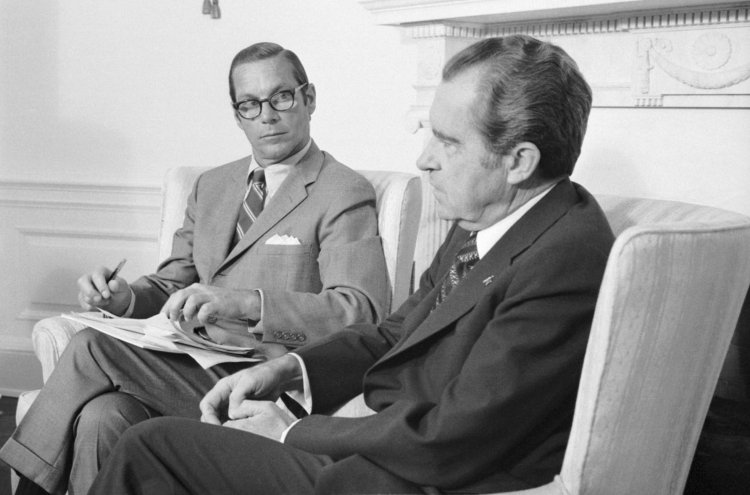He Secured a Confidential Agreement Boosting U.S. Economic Dominance — And He Shares Advice for Donald Trump -- Editorial
An overlooked negotiation from the Nixon era provides important insights relevant to today’s era of economic conflict.

At the heart of this contest for geopolitical influence is the control over chokepoints—vital nodes in the global economy dominant to one nation while alternatives are limited or unavailable. Nations that command these chokepoints wield profound leverage, granting them the power to restrict access for others and severely impact their economies.
Currently, the U.S. financial system stands as the most critical chokepoint, encompassing the dollar and the extensive network of banks and payment systems that drive global trade. Other significant chokepoints include technologies that form the backbone of advanced semiconductors, essential to the digital economy. The U.S., having solidified its control over these chokepoints during the hyperglobalization phase post-Cold War, is no longer reliant on expensive naval blockades or a united U.N. stance to impose severe penalties on nations—methods that were necessary even in the 1990s when dealing with Iraq. Now, with a simple signature, the U.S. president can enact economic sanctions far more impactful than previous blockades and embargoes.
However, as America has turned these chokepoints into weapons, other nations have taken notice, which poses a risk to its prevailing position. From Beijing to Brasília, many governments are racing to create alternative financial pathways, aiming to evade the fate of countries like Iran and Russia, which face heavy sanctions. Additionally, emerging technologies, including artificial intelligence, digital currencies, and clean energy systems, are establishing new chokepoints, spurring intense competition among global powers.
Trump’s awareness of this rivalry is evident in his repeated threats of imposing punitive tariffs on the BRICS—comprising 10 nations including Brazil, Russia, India, and China—should they attempt to develop an alternative to the dollar. Nonetheless, history illustrates that economic supremacy is more effectively garnered through attraction rather than coercion. To strengthen U.S. economic power, Trump ought to leverage his deal-making abilities, enticing other nations to align their economies with American finance and technology through incentives rather than penalties.
The complexity of economic warfare lies in the need to first draw others in and then keep them engaged. Should Trump fail to recognize this, his heavy-handed tactics may accelerate the very decline of U.S.-controlled chokepoints he seeks to thwart. A more effective strategy might echo the tactics employed by another Republican dealmaker who fortified American economic power decades ago.
In 1973, amid a tumultuous economy, President Richard Nixon appointed Treasury Secretary William Simon to mitigate the damages of a severe oil embargo. The mission bore the risk of failure; however, Simon expertly blended economic and military incentives, successfully negotiating a deal that fundamentally changed the global financial system, securing American dominance over a crucial chokepoint for years ahead.
The challenges of the early 1970s were grave for the U.S., with the economy faltering and Nixon's earlier policy of ending dollar-gold convertibility leading to floating exchange rates and a weakened dollar. Heavy expenditures from the Vietnam War exacerbated financial strain, and inflation reached levels not seen since the 1940s. Instead of attending to these mounting problems, Nixon became entangled in the Watergate scandal, and America faced declining energy independence.
On October 6, 1973, a coalition of Arab states attacked Israel, prompting Saudi Arabia and other members of OPEC to impose an oil embargo on the U.S., drastically restricting oil production and contributing to an energy crisis that saw prices spike and long lines at gas stations. U.S. Secretary of State Henry Kissinger warned of a potential “vicious cycle” leading to global economic collapse, a scenario that fell on Simon to avert.
Simon, a tough New Jersey native with a background in bond trading, made bold decisions to ration gasoline and prioritize oil allocation to essential industries over personal vehicle use. By the end of 1974, the American public was desperate as oil prices soared, and the nation teetered on the brink of financial disaster.
With the economy in peril, Nixon turned to Simon again, who had just taken on the mantle of treasury secretary. His solution entailed convincing the Saudis to invest their oil profits in U.S. government debt, fundamentally recycling dollars and addressing the U.S. deficit.
In July 1974, Simon embarked on a journey to Saudi Arabia under the influence of alcohol, yet he managed to negotiate a monumental agreement: the Saudis would invest in U.S. Treasury bonds in exchange for military support and continued oil purchases, thereby providing the U.S. with a crucial financing stream, leading to the inception of the petrodollar.
In the ensuing years, Simon’s deal faced challenges, especially as the dollar continued its downward trend and OPEC considered devaluing oil prices by using a basket of currencies instead. However, Simon's successor was able to renegotiate terms, ensuring that oil pricing remained in dollars, thus solidifying a structural element of the global economy dominated by the U.S.
Today, this dollar-centric financial system faces potential unraveling more than ever. China has made strides in attempting to supplant the petrodollar with the petroyuan, establishing the infrastructure to conduct oil trades in yuan and persuading nations to follow suit after the West's sanctions on Russia. The emergence of alternative financial systems is being shaped by countries across the globe, paving the way for initiatives like BRICS, which is exploring new payment systems for member trade.
Trump has reacted to these developments with threats of imposing tariffs but seems misaligned with the core issues, focusing on BRICS currency collaboration while neglecting the rise of alternative systems like mBridge and CIPS that promise faster, more efficient transactions compared to the traditional dollar-based framework.
To maintain its financial dominance, the U.S. must innovate and modernize its financial infrastructure. The current dollar transaction system, dating back to the 1970s, is sluggish, while digital networks enable rapid settlements. Additionally, Trump’s fascination with cryptocurrencies has favored speculative ventures rather than advancing U.S. financial technology to combat China's initiatives.
The contend for American financial leadership extends beyond China; Europe is also evolving in response to changing global dynamics. The Eurozone is seizing on opportunities, with European markets outperforming their American counterparts and a potential for the euro to emerge as a genuine alternative currency.
For Trump, who relishes in his role as a “Tariff Man,” it is crucial that he also harnesses his deal-making acumen to uphold American financial hegemony. The lesson from Simon’s negotiation is clear: economic superiority is nurtured, not coerced. Preserving U.S. financial preeminence requires offering compelling reasons for nations to remain tethered to the dollar-based framework, bolstering U.S. capital markets, enhancing alliances while judiciously distancing from adversaries, and ensuring America leads in financial technology.
Ultimately, America's financial primacy hinges on its reputation as a reliable steward of the global monetary system. Should internal political challenges undermine confidence in the Federal Reserve or the rule of law, the dollar's advantages over competing currencies risk diluting significantly.
Economic influence is not fixed; it must be actively sustained. William Simon recognized this imperative. The pressing question now is whether Donald Trump understands it as well.To effectively address the challenges to American financial leadership, Trump and his administration must prioritize a coordinated strategy that emphasizes both innovative approaches and strategic diplomacy. Rather than solely relying on punitive measures like tariffs, there is a pressing need to engage in proactive negotiations aimed at enhancing U.S. economic ties globally.
One potential avenue involves embracing the rapidly changing landscape of digital currencies and financial technologies. The U.S. must not only modernize its existing financial systems but also actively participate in shaping the development of new digital infrastructures. This includes further exploring central bank digital currencies (CBDCs), which have the potential to streamline transactions and provide a competitive edge in international commerce. By launching a robust U.S. digital dollar initiative, the U.S. could counter the advances made by China’s e-CNY and other emerging payment systems that threaten the dollar's primacy.
Furthermore, engaging in multilateral agreements and fostering alliances can reinforce America’s economic stature. Strengthening trade relationships with allies in Europe and Asia, while maintaining a united front against common adversaries, will enhance the U.S. position in negotiations over global financial frameworks. Collaborative efforts, like those seen in recent trade deals, can help ensure that U.S. interests are prioritized in the evolving landscape.
Additionally, soft power must play a more significant role in U.S. economic diplomacy. Encouraging investment in American innovation, education, and technology from foreign nations can create a more profound interdependence that benefits the U.S. economy. By promoting technology transfer and collaboration in emerging fields, the U.S. can reinforce its position as the leader in technological advancement, while also ensuring that countries remain economically tied to American standards and practices.
Another critical dimension is the need for regulatory clarity and stability within the U.S. financial system. Investors thrive on certainty, and any political maneuvers that threaten the independence of key institutions, such as the Federal Reserve, can undermine confidence in U.S. financial markets. Therefore, maintaining a commitment to the rule of law and upholding institutional integrity will be crucial for preserving the dollar's status and attracting investments.
Moreover, addressing domestic economic challenges is imperative. Income inequality, infrastructure decay, and educational disparities can weaken the U.S. economic position on the global stage. By investing in domestic growth and ensuring that American workers are equipped with the skills needed in an evolving workforce, the U.S. can solidify a competitive edge that transcends traditional economic power.
While Trump’s inclination towards tariffs reflects a broader trend of protectionism, successfully navigating the complexities of modern economics requires a balanced approach. Tariffs can serve as a negotiating tool, but reliance on them alone may provoke retaliation and diminish the very economic relationships that support U.S. interests. Thus, he must shift focus from a combative stance to one that emphasizes collaboration, engagement, and mutual benefits within the global economic order.
Historical lessons highlight that maintaining dominance in economic spheres is not merely about who wields the most power but about who can cultivate relationships that yield mutual prosperity. In a world increasingly characterized by multipolarity, the U.S. must adopt strategies that position it not just as a dominant power but as a collaborative leader. Acknowledging the interconnectedness of the global economy and fostering cooperative frameworks will be essential.
The path forward for Trump, and indeed American policymakers, involves recognizing the importance of adaptability in a rapidly changing world. It is about evolving from an era of unilateralism to one that embraces strategic partnerships and recognizes the agency of other nations in shaping global economic structures. Only through a nuanced understanding of the complexities at play, combined with a commitment to innovation and partnership, can the United States secure its financial preeminence in the decades to come.
Ultimately, the greatest challenge lies not just in responding to immediate threats but in anticipating the transformative shifts in the global economy. For Trump, as for any leader, the focus must be on creating an environment where the U.S. remains an attractive partner, a hub of financial innovation, and a cornerstone of global economic stability. The question remains: can he pivot effectively from being a "Tariff Man" to a transformative leader who champions collaboration and innovation? The future of American economic leadership depends on it.
Mark Siminowski for TROIB News
Find more stories on Business, Economy and Finance in TROIB business












